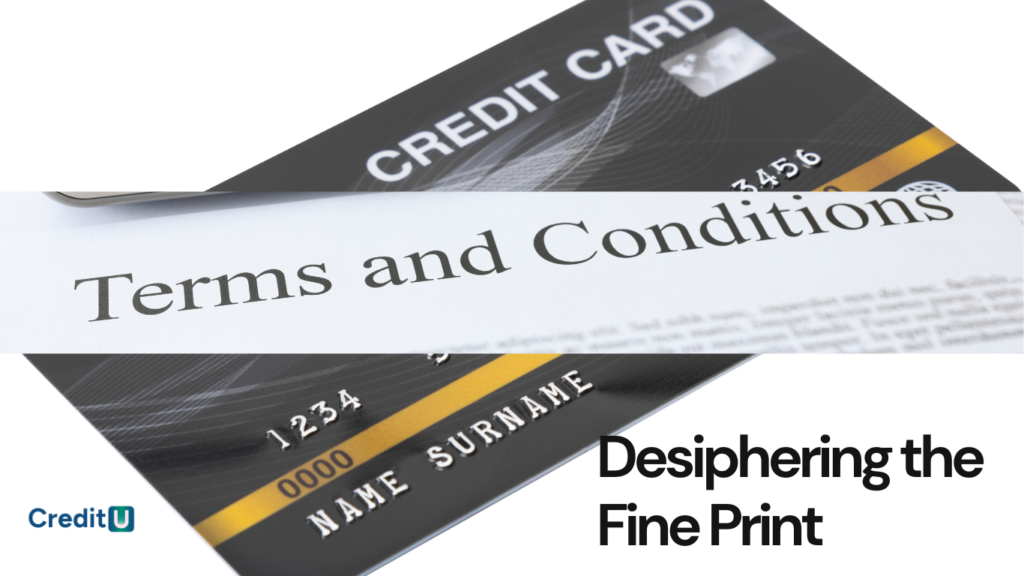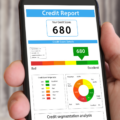Credit Card Terms You Should Know
February 1, 2024

Credit cards are powerful financial tools that, when used wisely, can help you manage your finances and build your credit score. However, navigating your credit journey can get confusing if you do not understand how they work! Credit Cards often come with a bunch of terms and conditions that are confusing and filled with jargon that can be harder to understand. Understanding your credit card terms is crucial for managing credit card debt effectively, paying off debt efficiently, and ensuring that your credit card works for you in your broader financial planning strategy.
Topics Covered: What are Credit Card Terms? Annual Fee APR - Annual Percentage Rate Balance Transfer & Balance Transfer Fee Billing Cycle Statement Balance Credit Utilization Rate Minimum Payment Credit Limit Late Fees Grace Period Cash Advance Rewards and Benefits Credit Card Terms Impact on Financial Planning and Debt Management How Can CreditU Help? Key Insights
What are Credit Card Terms?
Credit card terms comprise of the various conditions, rates, fees, and benefits that govern the use and management of a credit card. These terms define the relationship between the card issuer and the cardholder. They detail the rights and responsibilities of each party. Key elements include
- The Annual Percentage Rate (APR), which dictates the interest rate applied to balances
- The credit limit, determining the maximum borrowing capacity;
- Fees such as those for late payments or foreign transactions and
- Features like grace periods, which offer an interest-free window for repayments.
- Reward program specifics, delineating how cardholders can earn and redeem points or cashback.
Understanding these terms is crucial, as they affect the overall cost of credit, the cardholder’s credit score, and the ability to leverage benefits effectively. Therefore, being well-informed about credit card terms is not just about compliance, but also about making savvy financial decisions and maximizing the potential advantages of credit card usage. Let’s look at some of the more common credit card terms in detail to help you understand them better.
Common Credit Card Terms
Annual Fee
The annual fee is when your credit card company charges a fee every year from you to use a particular credit card. The types of credit cards that come with an annual fee will charge this fee directly to your credit card on the day you opened your account. Note, all credit cards do not come with an annual fee. Therefore when you make your decision on choosing a credit card, pay attention to these fees.
APR – Annual Percentage Rate
APR is the yearly interest rate charged on outstanding balances. Knowing the APR of your card is crucial as it determines how much you’ll pay in interest if you carry a balance. You can divide the APR by 12 to find your monthly interest rate. For example if your APR on the credit card is 12%, your monthly interest rate will be 1%. However, you must remember that Credit card interests are usually accrue daily. Therefore , if you like a more accurate picture of your interest rate you should divide your APR by 365.
Fixed APRs remain the same over time, while variable APRs can change based on the prime rate or another reference rate. Be aware of which type you have, as it affects how your interest charges could fluctuate. Legally it is required that credit card companies clearly define the APR terms in your cardmember agreement.
Balance Transfer & Balance Transfer Fees
This is the process of moving a balance from one credit card to another, usually to take advantage of a lower interest rate. This can come with fees and specific terms depending on the credit card. Most often them come with a low or 0% introductory APR to help you pay off debt for a limited time period. However you might be subjected to a balance transfer fee at the end of the introductory period. The fees might vary depending on the credit card terms of the issuer. These are generally outlined in the fine print of the card member agreement.
Billing Cycle
Your credit card payments are due at the end of each billing cycle. This is the time between the closing dates of your statement. When your billing cycle ends the credit card company calculates the statement balance. Each billing cycle will show any payments due from the previous statements as well as any transactions you made during the current cycle.
Statement Balance
At the end of your billing cycle your credit card company will send you your credit card statement, This can be through postal mail or can be shown electronically on your credit card company or banking mobile app. Your credit card statement balance in the amount you owe to the credit card company at the end of each billing cycle. This includes the total amount including the cost of all of the transactions, any fees, interest rates accumulated from the previous billing cycles and any unpaid balances. Ideally it is best to pay off the statement balance every month. This way you avoid accumulating any additional interest fees in the next cycle. You must also keep an eye on your credit limit vs the statement balance to ensure you are maintaining a healthy credit utilization ratio.
Credit Utilization Rate
This is also known as the credit utilization ratio. Essentially, this a percentage of your current credit card balance in relation to the available credit on your credit card. For example if you have a credit card balance of $500 on a credit limit of $2500 your credit utilization ratio is 500/2500×100%, which is 20%. Knowing your credit utilization ratio is important as it has a direct impact on your credit scores. The lower you maintain your utilization ratio across all your credit lines the better it is for the health of your credit rating. Therefore keeping your statement balances in check and making more than the minimum payments are important actions when it comes to using a credit card responsibly.
Minimum Payment
The minimum payment is the lowest amount you must pay each month to keep the account in good standing. While paying this amount keeps you from being late, it doesn’t do much to help you in paying off debt. Paying more than the minimum reduces your balance faster and decreases the interest you’ll pay over time. The minimum payment is decided by the credit card company depending on the card member agreement.
Credit Limit
Your credit limit is the maximum amount you can charge to your credit card. It’s determined based on your creditworthiness, including your credit score and income. Staying well below your credit limit is wise for credit utilization, a key factor in your credit score. High utilization can signal to lenders that you’re a riskier borrower.
Late Payment Fee
Making timely credit card payments is an important aspect of using your credit responsibly. As the term suggests, late payment fees occur when you fail to make on time payments on your statement balance. Your late payment fees cannot be bigger than your minimum payment due. If you are constantly late on your credit card payments you may want to pay more attention to your money management behaviors. If you miss your payments for more than 30 days from your due date, there is a chance your creditors may report this to the credit bureaus. This can have an adverse impact on your credit scores as they stay on your credit report for up to 7 years.
Grace Period
The grace period is the time between the end of your billing cycle and the due date for that cycle. Purchases made during this time won’t incur interest if you pay your balance in full by the due date. If you don’t pay your full balance, you may lose this grace period, leading to interest charges from the date of purchase. Grace periods are generally applied to new transactions and not balance transfers or cash advances.
Cash Advance
This is a cash withdrawal from your credit card account. Typically you can only get a cash advance that is lower than your total credit limit on a particular credit card. The APR on these cash advances are also higher than the APR applied to your purchases. Once you take the cash advance, interest begins to accrue immediately without any grace periods.
Rewards & Benefits
Many cards offer rewards like cash back, points, or miles based on your spending. Understanding how you earn and redeem these rewards can maximize their value. Benefits such as rental car insurance, travel insurance, and extended warranties can add significant value. Be aware of these perks and understand how to use them. Your credit card terms in the card member agreement usually outlines these benefits in detail. Make sure you optimize these benefits with the use of your credit cards.
Credit Card Terms Impact on Financial Planning & Debt Management
Understanding credit card terms is not just about avoiding fees or optimizing rewards. It’s about integrating your credit card use into your overall financial planning and debt management strategy. It’s crucial for managing credit card debt efficiently and ensuring that your credit use aligns with your financial goals.
Remember, while credit cards offer convenience and benefits, they also represent a responsibility to spend and manage your finances wisely. Taking the time to understand your credit card terms fully equips you with the knowledge to make informed decisions, paving the way for financial stability and peace of mind.
How Can CreditU Help?
Financial literacy is undoubtedly one of the most important skills to maintain financial freedom. It equips individuals with the knowledge and skills to manage their finances effectively and make smart financial decisions. In today’s world, where credit cards and loans are readily available, it’s easy to fall into a debt trap. However, with the CreditU app, it’s not just a bunch of random finance facts thrown at you. The app offers tailor-made financial education based on your specific financial situation. It makes it an excellent tool for those who wish to improve their financial literacy.
One of the key features of the CreditU app is the ability to add your credit card accounts, sources of income, expenses, and debt to your profile. This allows you to get an overview of your finances, making it easier to manage your money properly. The app also offers a financial goal-setting feature, which allows you to create goals, such as paying off your credit card debt. You can track your progress towards these goals and get encouragement along the way, making it easier to stay on track.
Moreover, CreditU’s financial education is designed to be accessible and easy to understand, even for those who find finance daunting. The app offers personalized financial tips and guidance, making it an excellent tool for those who wish to improve their financial literacy. With CreditU, you can take control of your finances and work towards achieving your financial goals, whatever they may be.
ACCC is now placing their 30 plus years of financial expertise into the palm of your hand! Meet CreditU, your new destination for personal finance. Create budgets, add income/ expenses, input your debts, insert your bank accounts, and upload your credit card accounts. Get an overview of your finances on the go and improve your money management skills. CreditU also offers financial education tailor-made to fit your personal finance situation. Download the CreditU app today!
Key Insights
- Understanding credit card terms can help you maintain healthy credit by avoiding unnecessary fees and charges.
- Keep track of your credit card usage at all times to avoid late payments, additional charges and interest fees.
- Use your credit cards wisely and try to maintain a lower credit utilization ratio to keep your credit scores in good standing.
- Before you enter into an agreement to obtain a credit card make sure you read al of the fine print carefully to understand all fees, charges and regulations associated. ..
Back To Top
Last Updated on February 1, 2024 by Dilini Dias Dahanayake






